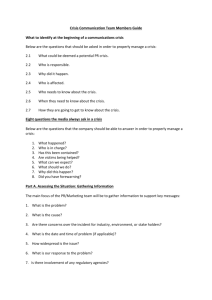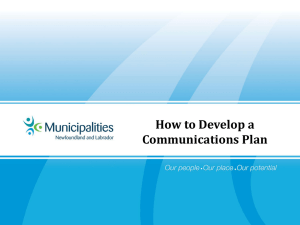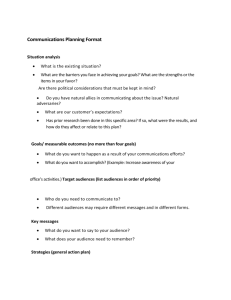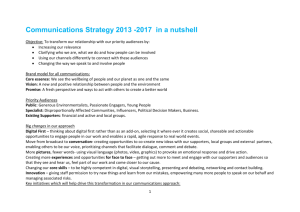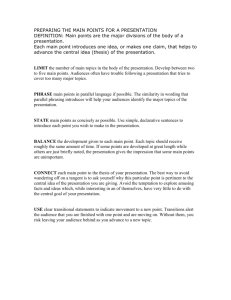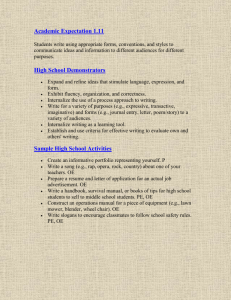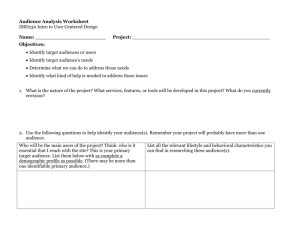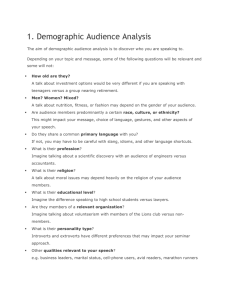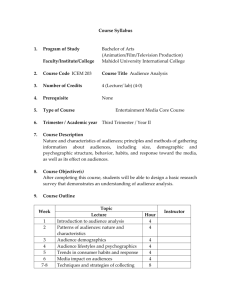Please enter name here
advertisement
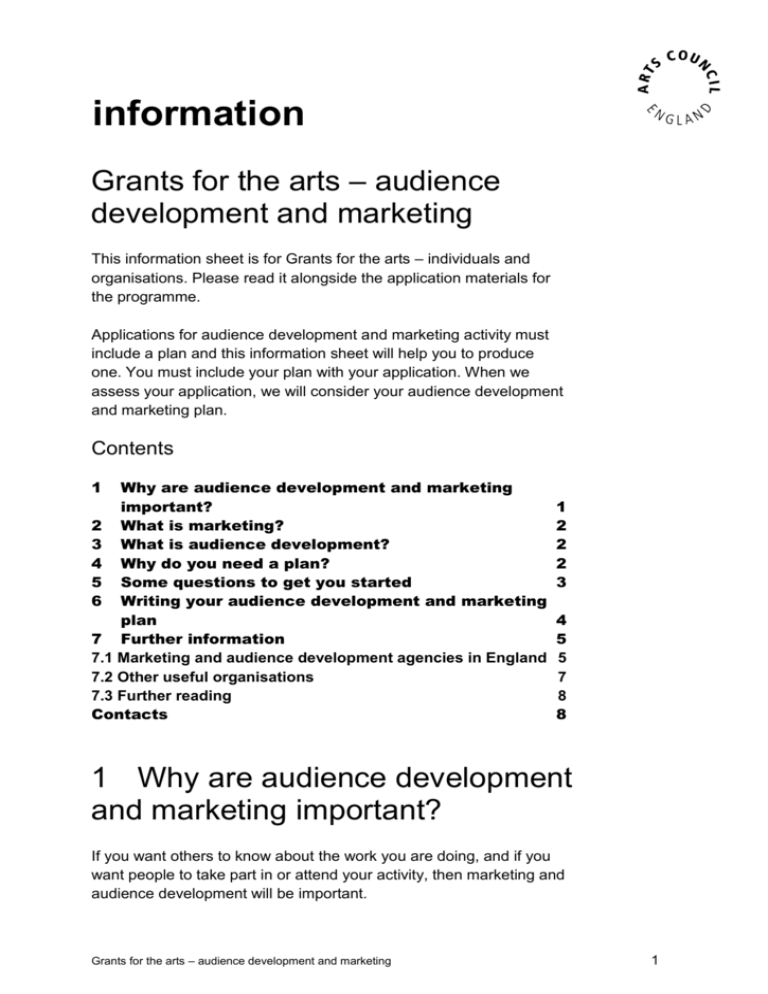
information Grants for the arts – audience development and marketing This information sheet is for Grants for the arts – individuals and organisations. Please read it alongside the application materials for the programme. Applications for audience development and marketing activity must include a plan and this information sheet will help you to produce one. You must include your plan with your application. When we assess your application, we will consider your audience development and marketing plan. Contents 1 Why are audience development and marketing important? 2 What is marketing? 3 What is audience development? 4 Why do you need a plan? 5 Some questions to get you started 6 Writing your audience development and marketing plan 7 Further information 7.1 Marketing and audience development agencies in England 7.2 Other useful organisations 7.3 Further reading Contacts 1 2 2 2 3 4 5 5 7 8 8 1 Why are audience development and marketing important? If you want others to know about the work you are doing, and if you want people to take part in or attend your activity, then marketing and audience development will be important. Grants for the arts – audience development and marketing 1 2 What is marketing? Marketing is the process of planning that allows you to meet your goals and the needs of audiences. It encourages you to consider the audience perspective as you plan your activity. You should look at things like choice of activity, where and when the activity will take place, possible costs for the audience, and methods of involving and communicating with potential audiences and participants. 3 What is audience development? Audience development is based on the same principles as marketing, but it is about increasing the range of audiences not just increasing the numbers of attendees. By understanding and knowing your existing and potential audience, you can develop a relationship with them and communicate effectively with them. Arts Council England uses the following definition: ‘The term audience development describes activity which is undertaken specifically to meet the needs of existing and potential audiences and to help arts organisations to develop ongoing relationships with audiences. It can include aspects of marketing, commissioning, programming, education, customer care and distribution.’ ‘Audience’ includes attendees, visitors, readers, listeners, viewers, participants, learners and people who purchase works of art. 4 Why do you need a plan? Having an audience development or marketing plan will help you to focus on who you want to reach and how you will reach them. It will help to identify how much it will cost to put your plans into action. Within the plan you can develop ways of serving existing audiences, finding new ones, earning income and seeking new opportunities and partnerships. Your plan should reflect the overall nature of your work or the work of your organisation. A plan does not have to be complicated or lengthy. Grants for the arts – audience development and marketing 2 5 Some questions to get you started Before writing your plan you could begin by asking yourself some questions. The answers to these questions can be developed into sections of your audience development and marketing plan. Some of these questions may not be relevant to you. What services do you provide? Who are your present audience or attendees? How do you reach them? Do you have new activities you want to do? Who do you want to reach with these new activities? What do you think the potential demand is? Have you asked for the views of your customers? If so what did you find out? If you have staff, do they have enough time to focus on the needs of audiences? What marketing and audience development work have you undertaken in the past? How successful was it? What ideas do you have for new audience development and marketing? Have you carried out any evaluation work that could help with your plan? Are there other people you could learn from, for example people who have experience of doing similar things? What other sources of income do you have? If you have financial targets, are you meeting them? If you sell tickets, how many are you selling and to who? What are your prices? How have they changed over the last few years? Do you have a marketing or audience development budget? Is it adequate? What additional money will you need to put your new ideas into place? Where will the money come from? Who are your main competitors and how do they compare with you? What influences might affect your project, such as social or economic issues nationally or locally? What are your strengths, weaknesses, opportunities and threats? (This is known as a SWOT analysis.) Grants for the arts – audience development and marketing 3 6 Writing your audience development and marketing plan There are no set rules about what you should include in your audience development and marketing plan, or how long it should be. The length and level of detail will depend on how ambitious your plans are and how much they will cost. This section provides information on the main headings you should include in your plan. 1 Background information on you and your current activities Briefly describe what you currently do, and explain why you have decided that you need to do the audience development and marketing activity that you are asking us to fund. 2 Your objectives Clearly set out the objectives and targets for your audience development or marketing activities. Make them smart (SMART) – specific, measurable, achievable, relevant and timely. 3 The details of your activity Describe the target audience or participants for the activity (be specific, identify each ‘audience type’, for example students aged 18–24). Provide details of how many people you are hoping to involve (be specific and break this down by each ‘audience type’). Describe the benefits and why it would appeal to them. Describe what is unique or different about your activity and plans. 4 Demand for your activity Describe how you know that there is demand for your activity from your target audience, and provide details of any research you have carried out. 5 Audience development and marketing methods Describe the tools, approaches and methods you plan to use to reach your target group. 6 Timetable Provide details of the timetable for your activities, give exact dates if possible. 7 Budget Provide details of the income and expenditure for your audience development and marketing plan, and remember to include the costs of evaluating your plans. Where possible break down the figures to show the detail of the budget. Grants for the arts – audience development and marketing 4 8 Evaluation Describe how you will evaluate the success of your plan against your objectives and targets. For example, how you will find out if you have reached the people you wanted to reach. Include information on when you will do this and who will be involved. 7 Further information Arts Marketing Association 7a Clifton Court Clifton Road Cambridge CB1 7BN Website: www.a-m-a.co.uk The professional development body for those promoting the arts and cultural industries. The Chartered Institute of Marketing Moor Hall Cookham Maidenhead Berkshire SL6 9QH Website: www.cim.co.uk The professional development body for those working in the marketing industry. 7.1 Marketing and audience development agencies in England The agencies offer co-ordinated marketing resources at a local, regional and national level. They are committed to working closely with other arts organisations, particularly on strategic planning for audience development. Audiences Central 601 The Big Peg 120 Vyse Street Birmingham B18 6NF Website: www.audiencescentral.co.uk Grants for the arts – audience development and marketing 5 Arts About Manchester Churchgate House 56 Oxford Street Manchester M1 6EU Website: www.aam.org.uk Audiences North East Holy Jesus Hospital City Road Newcastle NE1 2AS Website: www.audiencesnortheast.org.uk Audiences London Unit 7G1 The Leathermarket Weston Street London SE1 3ER Website: www.audienceslondon.org AMH Mottisfont Court Tower Street Winchester SO23 8ND Website: www.amhonline.org.uk Audiences Yorkshire 3 St Peter's Buildings St Peter's Square Leeds LS9 8AH Website: www.audiencesyorkshire.org.uk Momentum Arts Bolton's Warehouse Tenison Road Cambridge CB1 2DG Website: www.momentumarts.org.uk Grants for the arts – audience development and marketing 6 Sussex Arts Marketing Unit 11B Dyke Road Mews 74 Dyke Road Brighton BN1 3JD Website: www.artsinsussex.com Marketing the Arts around Surrey Smart Audiences Leatherhead Enterprises Centre Randalls Road Leatherhead KT22 7RY Website: www.smartaudiences.co.uk South West Arts Marketing St Nicholas Church St Nicholas Street Bristol BS1 1UE Website: www.swam.org.uk The Entertainment and Arts Marketers (Merseyside) Ltd 4th Floor Gostin Building 32-36 Hanover Street Liverpool L1 4LN Website: www.team-uk.org 7.2 Other useful organisations Voluntary Arts Network PO Box 200 Cardiff CF5 1YH Website: www.voluntaryarts.org Voluntary Arts Network aims to promote participation in the arts and crafts across the UK and the Republic of Ireland, and increasingly in Europe. Grants for the arts – audience development and marketing 7 Fuel4arts Website: www.fuel4arts.com Fuel4arts.com delivers free audience and market development tools and ideas to professional arts marketers and artists. New Audiences Website: www.newaudiences.org.uk New Audiences was set up by the Arts Council to encourage as many people as possible, from all backgrounds and every walk of life, to participate and benefit from the arts. Projects, features, reports and publications are available for download from the website. 7.3 Further reading Unless otherwise noted, you can download the following books or find out how to order a copy from our website, www.artscouncil.org.uk A practical guide to developing and managing websites, Roger Tomlinson, Vicki Allpress, Arts Council England, 2004. Comprehensive advice on using websites to achieve marketing objectives. A practical guide to working with arts ambassadors, Mel Jennings, Arts Council England, 2003. An invaluable guide for anyone considering an ambassadors’ scheme. Partnerships for Learning, Felicity Woolf, Arts Council England, revised and updated 2004. Designed to help organisations and individuals evaluate arts education projects. Marketing and touring: A practical guide to marketing an event on tour, Heather Maitland, Arts Council England, 2004. Thinking Big: A guide to strategic marketing planning, Stephen Cashman, Arts Marketing Association, 2003. Available from SAMS Books on 01883 345011. Contacts Arts Council England 14 Great Peter Street, London SW1P 3NQ Website: www.artscouncil.org.uk Phone: 0845 300 6200 Textphone: 020 7973 6564 Email: enquiries@artscouncil.org.uk © Arts Council England, August 2006 Grants for the arts – audience development and marketing 8
